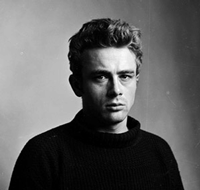By JERRY TALLMER
New releases of James Dean films revives the fascination with a born leading man
The overused, much-abused, cliché word for it is charisma. The old-fashioned words for it are magnetism or sex appeal or star power. Like Mr. Justice Potter Stewart on pornography, one cannot define it, but one knows it when one sees it.
Sheridan Square Playhouse, 1962. In the second act of “The Days and Nights of Beebee Fenstermaker” – a play about the screwed-up life of a young woman in Greenwich Village – the sudden entrance and controlled power of a rube in cowboy boots drives the whole show into a new, exciting, sweeter dimension. The program gives us the name of the actor: Robert Duvall.
Ambassador Theatre, Broadway, 1966. “The Lion in Winter.” In the middle of the piece a young unknown playing the young Prince Philip, future king of France, makes a casual, caustic entrance that jolts me upright in my seat. The actor’s name: Christopher Walken.
Theater Four, 1968 (the night Robert F. Kennedy’s body was being conveyed to Arlington). The drama is “The Boys in the Band.” In the last instant of act one, the character named Harold enters, leans in the doorway, and with a sneering hello grabs the entire show by the balls. Actor’s name: Leonard Frey.
Well and good. And a few years before all that, a play called “The Immoralist” opened at the Royale Theatre on Broadway. It was a somewhat watered-down dramatization by the husband/wife team of Augustus Goetz and Ruth Goetz of André Gide’s confessional autobiographical novel about the pro-forma marriage of a man he calls Michel to a woman called Marceline, her ever more serious illnesses, his homosexuality, guilts, betrayals (mostly with young Arabs), shattered responsibilities.
Louis Jourdan, that most stunningly handsome of leading men, played Michel. Marceline was played by Geraldine Page, two short years after her astonishing breakthrough as Alma Winemiller in José Quintero’s staging of Tennessee Williams’ “Summer and Smoke” at Off-Broadway’s Circle-in-the-Square.
It was all, as I remember it, this “Immoralist” on Broadway, rather slow and staid and, I’m afraid, forgettable…until suddenly, deep into the show, a brooding, anonymous figure suddenly somehow materialized on stage from behind a piece of furniture, a couch or something — a presence as dark and crackling as the lightning from a thunder cloud. But all the more dangerous for his silences.
That moment, that actor, we were not to forget.
The figure behind the couch was Bachir, the Arab youth who was to seduce and subsequently blackmail Michel, and the actor – let us steal a glance at the program! – was somebody named James Dean. The same James Dean whose death in a crashed auto 19 terrifyingly short months later – or 50 years ago this coming September — will be commemorated by two weeks of screenings of new prints of “East of Eden,” “Rebel Without a Cause,” and “Giant” starting June 10 at Film Forum on Houston Street.
In later years his birthday would become well known, though not quite as well known as his death day. James Dean was born in Marion, Illinois, on February 8, 1931, which means that the opening of “The Immoralist” on February 8, 1954, occurred on his 23rd birthday. His only previous appearance on the New York stage had been two years earlier in N. Richard Nash’s “See the Jaguar” which ran for five performances – not caught by me — at the Cort.
I do not know (or care) whether James Dean was, as some believe, a closet homosexual – a theory that owes something to the manifest longing for him by Plato, the tortured kid played in “Rebel Without a Cause” by Sal Mineo, who later would come way out of the closet through his own staging of “Fortune and Men’s Eyes.”
I do know and care that James Dean would hold the love and care of such real women as Julie Harris, who played his sister in “East of Eden,” and Elizabeth Taylor of “Giant,” who said the one most trenchant thing that I can find in three pages of postmortem quotes about him on the Internet: “He was very afraid of being hurt. He was afraid of opening up in case it was turned around and used against him.”
And then there’s Geraldine Page. Though I got to know her quite well over the years, we never happened to discuss James Dean. But one day as we chatted in Bryant Park (before it became Needle Park), this happened. In my enormous profundity I said to her something screechingly stupid like: “Oh, you actors have such complicated lives.” She looked me between the eyes and coolly responded: “Everybody has a complicated life.”
We all know, or think we know, what the James Dean in our hearts stood for, stands for. His more externalized reputation endures only in those three Hollywood pictures. But perhaps the essence of James Dean is still better memorialized in lines from two movies of his era that he was not in. From “Knock on Any Door,” 1949: “Live fast, die young, and make a beautiful corpse.” From “The Wild One,” 1953: “What are you against?” the girl asks. “What have you got?” says James Dean’s path breaker, Marlon Brando.





































